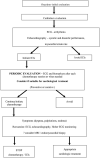Immune Checkpoint Inhibitors and the Heart
- PMID: 34660728
- PMCID: PMC8511816
- DOI: 10.3389/fcvm.2021.726426
Immune Checkpoint Inhibitors and the Heart
Abstract
Immune checkpoint inhibitors (ICIs) represent a break-through treatment for a large number of cancer types. This treatment is increasingly being recommended. ICIs are prescribed for primary tumours and for metastases, adjuvant/neo-adjuvant therapy. Thus, there is an increased need for expertise in the field, including the ways of response and toxicities related to them. ICIs become toxic because of the removal of self-tolerance, which in turn induces autoimmune processes that affect every organ. However, when relating to the heart, it has been noticed to be leading to acute heart failure and even death caused by various mechanisms, such as: myocarditis, pericarditis, arrhythmia, and Takotsubo cardiomyopathy. This review aims to address the above issues by focusing on the latest findings on the topic, by adding some insights on the mechanism of action of ICIs with a special focus on the myocardial tissue, by providing information on clinical manifestations, diagnosis and (wherever possible) treatment of the cardiotoxic events related to this therapy. The information is expanding and in many cases, the articles we found refer mainly to case-presentations and studies conducted on small populations. However, we consider that it is worthwhile to raise awareness of this new treatment, especially since it is widely now and it provides a significant increase in the survival rate in patients who receive it.
Keywords: CTLA-4; PD-L1; cancer; cardiotoxicity; chemotherapy; immune checkpoint inhibitors; immune-related adverse events.
Copyright © 2021 Mocan-Hognogi, Trancǎ, Farcaş, Mocan-Hognogi, Pârvu and Bojan.
Conflict of interest statement
The authors declare that the research was conducted in the absence of any commercial or financial relationships that could be construed as a potential conflict of interest.
Figures
References
-
- Puzanov I, Diab A, Abdallah K, Bingham CO, Brogdon C, Dadu R, et al. . Managing toxicities associated with immune checkpoint inhibitors: consensus recommendations from the Society for Immunotherapy of Cancer (SITC) Toxicity Management Working Group. J Immunother Cancer. (2017) 5:95. 10.1186/s40425-017-0300-z - DOI - PMC - PubMed
Publication types
LinkOut - more resources
Full Text Sources
Other Literature Sources
Research Materials



